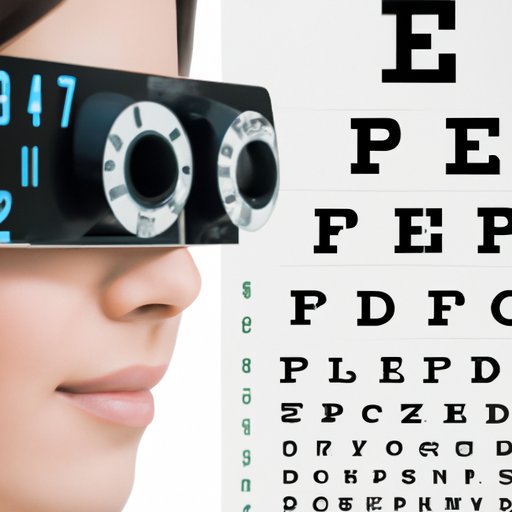
Introduction
Taking care of your vision and eye health is essential, and regular eye exams are a crucial part of achieving this goal. While eye exams may not seem necessary if you have perfect vision, they can catch eye problems early, prevent serious concerns, and ensure you have the right prescription for your eyeglasses or contact lenses. In this article, we’ll explore why routine eye exams are important and how often you should schedule them depending on your age, health condition, and other factors.
The Importance of Routine Eye Exams: How Often Should You Schedule Them?
Eye exams involve a series of tests to evaluate how well your eyes are functioning. These tests include a visual acuity test, a refraction test to determine your prescription for glasses or contact lenses, and other exams to check the health of your eyes. Regular eye exams are essential as they help detect potential eye problems and diseases, such as glaucoma, cataracts, and macular degeneration. Such conditions can cause blindness if not treated on time. Therefore, it’s crucial to schedule a routine eye exam every two years if you’re under 65 and if you’re over 65, then annual check-ups are necessary. However, if you have a family history of eye diseases, cardiovascular conditions or diabetes, or if you’re experiencing eye problems such as blurry vision, eye pain, or flashes, you should get an eye exam more frequently.
When choosing an eye doctor, ensure that they have proper training and are qualified to conduct thorough eye exams. Optometrists, ophthalmologists, and opticians are some of the specialists you can choose from.
Don’t Take Your Vision for Granted: The Frequency of Eye Exams
Delaying or avoiding routine eye exams may lead to serious vision problems if an underlying condition or disease goes unnoticed. Vision changes can happen gradually, and you may not notice a problem right away. However, with regular eye exams, eye conditions can be detected early, and a treatment plan can be put in place. A comprehensive eye exam can identify potential concerns like eye tumors and issues with eye movement. Eye disease evaluation becomes critical if you have:
- A family history of diabetes, high blood pressure, or eye diseases
- Medical conditions like autoimmune diseases or HIV/AIDS
- Occupational exposure to poor lighting or toxic substances
- Trauma, infection, or sight loss in one or both eyes
- Allergies that affect your eyes
If you’re in good health and don’t have any risk factors mentioned above, you should get a routine eye exam every two years until you’re 45 years old. Afterward, it’s recommended that you get an eye exam annually.
The Link Between Eye Health and Overall Wellness: How Often Should You Get an Eye Exam?
Taking care of your eyes is essential for your well-being. Eye health is connected to a range of physical and mental health problems like diabetes, high blood pressure, and stroke. Eye conditions can also lead to anxiety, social isolation, and depression. To maintain good eye health and avoid such conditions, consider receiving regular eye exams. Besides routine eye exams, you can maintain visual wellness by:
- Wearing sunglasses or hats with brims to protect your eyes from harmful UV rays
- Implementing a 20-20-20 rule when using digital devices: Every 20 minutes, take a 20-second break, and look at something 20 feet away.
- Adjusting screens to reduce eye strain
- Ensuring your diet includes foods rich in vitamins, minerals, and omega-3 fatty acids
- Increasing your daily physical activity.
The frequency of eye exams varies according to your age and risks. It’s generally recommended that you start receiving eye exams as early as six months old and continue every two years until you’re 18 years old. If you have taken an eye exam, but there are no problematic issues, you can visit an eye doctor every two years until you’re 60 years old, after which you should get an annual examination.
The Financial Benefits of Regular Eye Exams: Saving Money in the Long Run
Regular eye exams come with a financial advantage because early detection allows for timely care, and serious conditions and treatments can be avoided. Early detection can help individuals save money that they could incur from future office visits, hospital admission, and complex treatment procedures. When it comes to achieving affordable eye care, investigate available options like vision insurance plans, health savings accounts, and flexible spending accounts. Visit eye care centers and find out if they offer discounts or loyalty programs that can reduce the cost of routine eye exams.
Breaking Down the Numbers: How Often Should You Really Have an Eye Exam?
The frequency of eye exams depends on various factors, including age, overall health, and family history. You can always consult with your eye physician to establish a schedule that works best with your lifestyle and health needs. During the appointment, you can expect a comprehensive eye examination that covers different areas such as:
- A discussion of your overall health and medical history
- Eye muscle movement measurements
- Eye focusing, sharpness, and visual acuity evaluations
- Color vision assessments
- Inspection and evaluation of all parts of the eye and surrounding tissues either by using a slit-lamp microscope or other instruments
Conclusion
Regular eye exams are essential in maintaining healthy eyes, and it’s essential that you consult with your doctor to determine how often you should receive one. This article has outlined the importance of routine eye exams, how often you should get them based on your age and risk factors, and various tips to maintain optimal eye health. Remember to schedule an eye exam if you haven’t had one recently, and continue to practice good eye care habits to maintain your visual wellness.




